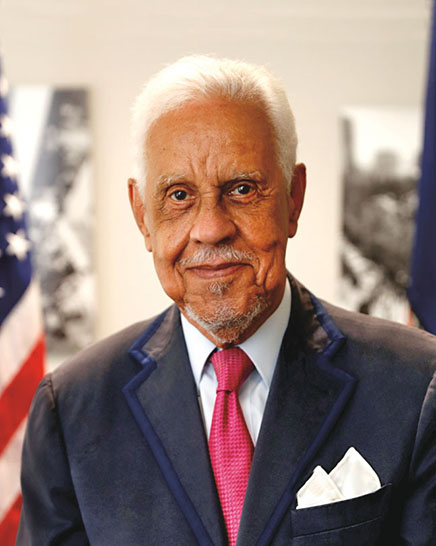Governor’s Voice
Fighting for people of color through education and opportunities

L. Douglas Wilder
Few in the political landscape have been more outspoken on the subject of the funding gap between Virginia’s Predominantly White Institutions (PWIs) and Historically Black Colleges and Universities (HBCUs) than our own Distinguished Professor L. Douglas Wilder. In June,- Gov. Glenn Youngkin signed a Virginia state budget fulfilling a campaign promise to support the state’s HBCUs. The budget provides almost $900 million in funding to Virginia’s HBCUs and $100 million to launch lab schools within community colleges and HBCUs.
We sat down with Governor Wilder to get his thoughts on the new budget and his experiences as the 66th Governor of Virginia in securing resources for HBCUs.
Q. Governor, you, along with your former Education Secretary Jim Dyke, called on a bipartisan group of legislators to provide federal funding to HBCUs from the American Rescue Plan last year, stating that significant investment was needed to redress the “long-standing denial of education opportunities” of Black Virginians. This call was essentially answered in June with the passage of the new budget. What does this victory mean for you?
A. To the extent HBCUs have been ignored for decades by those in authority and systemically disadvantaged by underfunding and fewer resources, this is a start, not a conclusion. Leveling the field for HBCUs, which have and continue to play a disproportionate role in educating underserved communities, will require eternal vigilance.
It is not a problem that we can simply throw money at. Lawmakers and the citizens who elect them will need to evaluate the performance of these and other investments to ensure that HBCUs continue to flourish for generations to come.
Q. As a Virginia governor, you were able to secure support for capital projects and expand the state’s tuition assistance grant program to include residents attending private colleges and universities, a significant coup for the state’s private HBCUs. What were some of the challenges you faced in meeting the needs of HBCUs during your administration?
A. I was left with no money in my administration; in fact, I was left with a deficit of $2.5 billion. Yet, I was able to include two of the HBCUs, Norfolk State and Virginia State, in the largest capital bond referendum in our state’s history. I secured agreement with the legislature for new buildings on their campuses. I stressed the need to reevaluate the needs of Virginia Union and Hampton universities. I felt there were no constitutional restraints against state funding for Virginia Union and Hampton universities.
Q. Beyond the events of 2020, to what do you attribute this groundswell of political support for HBCUs?
A. The old expression still holds true: The wagon that makes the noise gets the grease. There really is no groundswell. In fact, Virginia is still not in compliance with the Adams case decided in 1977. Some people have looked back at the outcome of our 2020 statewide elections, which were not projected to be a sweep for Republicans, and are perhaps beginning to see the Black electorate as consequential. Democrats cannot win elections without the support of the Black electorate. While I certainly hope that this recognition is not part of a political calculus, it might well be the impetus for change.
Fall 2022 / In this issue
- Letter from the dean's office
- Bold and noble: Susan Gooden leads NASPAA to new heights
- NSF grant will help fight the opioid epidemic across communities
- Governor’s Voice
- Wilder School graduate leads HBCU support in the White House
- Investigating Richmond's history of displaced communities
- Collaborating to combat housing insecurity
- Alumni spotlight: Leah Fremouw from the corner office
- Verbatim: Identifying cybersecurity threats
- Changemaker: Steven Keener
- On the RISE
- Why I give to the Wilder School
- 2022 Excellence in Virginia Governance Award honorees
- Faculty, alumni and student achievements